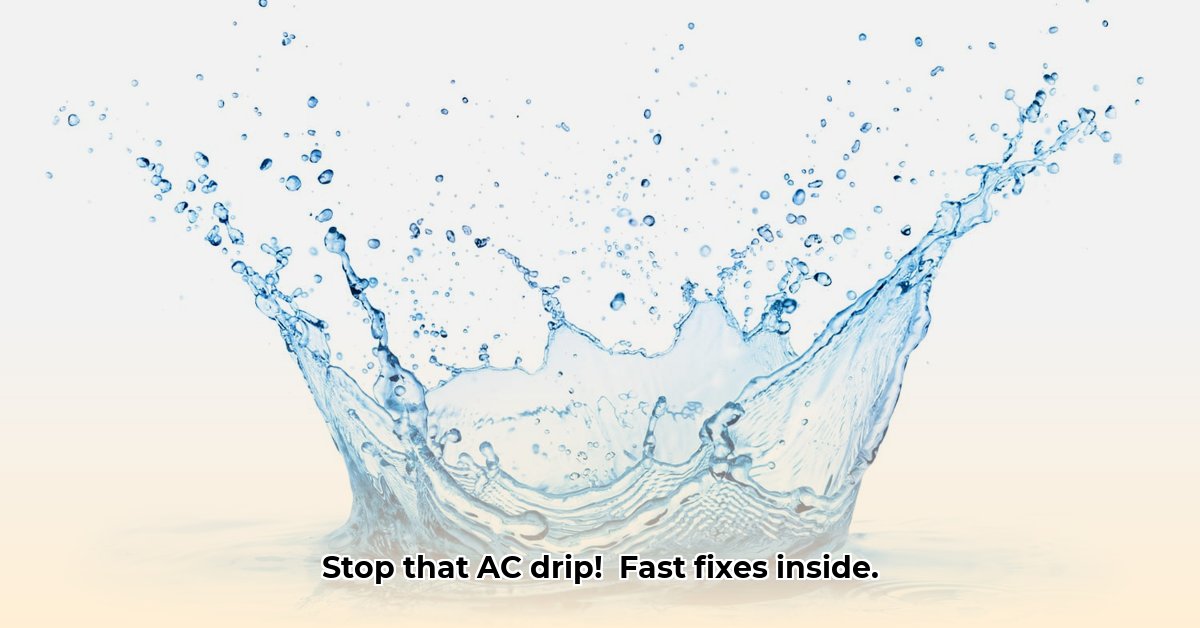Water dripping from your air conditioning vents? Let’s get it resolved! This guide helps you figure out the cause and fix it, whether it’s a simple DIY task or a job for a professional. We’ll cover the common reasons this happens, step by step, so you can quickly stop the drip. Plus, we’ll share tips to prevent it in the future. Let’s get your AC working perfectly and keep your home dry! For more serious issues, like compressor problems, see [this guide](https://turthledeep.com/how-do-i-know-if-my-ac-compressor-is-bad/).
Water Dripping from Your AC Vent: Quick Fixes and What to Do
Water dripping from an AC vent is a common problem. Luckily, you can usually handle it yourself. Let’s troubleshoot this together, step-by-step, to find the cause and solutions.
1. The Air Filter: Your First Defense
Check your air filter first. A dirty, clogged filter restricts airflow, causing coils to freeze and drip. Replacing it with a clean one is often the solution! Changing your air filter regularly helps prevent AC issues. Dirty air filters lead to major AC problems. Set a reminder to change yours every month!
2. Condensate Drain Line: Where the Water Goes
Your AC pulls moisture from the air to cool your home. This moisture goes through the condensate drain line, like the AC’s plumbing. If this line gets clogged, water backs up and leaks from your vents. Here’s how to fix it:
- Find the Drain Line: Look for a thin pipe near your AC unit. Use a flashlight if needed.
- Check for Clogs: Examine the line for blockages like dirt, mold, algae, or insects.
- Clear the Clog: Use a shop vacuum to gently suction out debris. For stubborn clogs, use a solution of white vinegar and water. Let it sit, then vacuum again. Be patient; it may take a few tries.
- Condensate Pump Check (If Applicable): Some ACs have pumps to remove water. Ensure it’s working and pushing water away. If not, a professional may be needed.
3. The Drain Pan: The AC’s Water Collector
The drain pan sits under the evaporator coil to catch condensed water. If it’s cracked, overflowing, or tilted, water can spill into your vents. Inspect it visually. If cracked, seal it or replace the pan. Check the drain pain.
4. Ductwork: Air Leaks and Condensation
Air ducts distribute air throughout your home. Gaps or poor insulation can cause condensation. Inspect ducts for cracks or holes. Seal any you find to prevent condensation and improve efficiency. Well-maintained ducts ensure efficient air conditioning. Repairing ductwork saves money in the long run!
5. The Evaporator Coil: A Serious Issue (Call a Pro)
A frozen evaporator coil is a serious problem. Ice buildup indicates airflow issues, refrigerant problems, or a faulty fan. This requires an HVAC professional. DIY attempts can cause more damage.
6. When to Call HVAC Professionals
If you’ve tried everything and the AC vent still drips, call the experts. Refrigerant leaks or faulty parts (compressor, blower motor, expansion valve) require a qualified technician. These issues can be dangerous.
7. Preventative Maintenance: Avoid Future Leaks
Regular maintenance is key to preventing dripping AC vents. Change your air filter monthly. Schedule professional inspections and cleaning of your AC unit yearly. Think of it as preventative care for your home’s comfort. Regular HVAC maintenance prevents emergency repairs. It also ensures consistent comfort.
Summary of Problems & Solutions:
| Problem | Solution | Severity | DIY-able? |
|---|---|---|---|
| Clogged air filter | Replace the air filter. | Low | Yes |
| Clogged drain line | Clean the drain line; use a vacuum or vinegar solution. | Medium | Usually |
| Cracked/Overflowing drain pan | Inspect and repair (seal, or replace) the drain pan. | Medium | Possibly |
| Leaky ductwork | Seal any leaks with appropriate sealant. | Low | Yes |
| Frozen evaporator coil | Likely requires professional service. | High | No |
| Refrigerant leak | Requires professional service. | High | No |
| Faulty condensate pump | Requires professional service. | High | No |
Catching AC vent drips early prevents costly water damage and extends your system’s life. Don’t hesitate to seek professional help if needed. Your comfort (and ceiling) will appreciate it.
How to Fix a Dripping AC Vent with a Frozen Evaporator Coil
Key Points:
- A frozen evaporator coil often causes dripping AC vents.
- Restricted airflow leads to ice buildup.
- A clogged condensate drain line contributes to the problem.
- Simple fixes include changing your air filter and checking the drain.
- Severe issues require professional HVAC repair.
Water dripping from AC vents? A common cause is a frozen evaporator coil. Let’s address this step-by-step.
Understanding the Problem: How to Fix a Dripping AC Vent with a Frozen Evaporator Coil
Your AC cools the air using refrigerant. Refrigerant absorbs heat, forming condensation on the evaporator coil. This water drains through a condensate line. When airflow is restricted, the coil freezes. This ice melts, causing dripping vents.
Troubleshooting Steps:
- Check Your Air Filter: A clogged filter restricts airflow, freezing the coil. Replace or clean it immediately.
- Inspect the Condensate Drain Line: Find the drain pan and line. Check for clogs. Remove any small amounts of backup by hand. Significant blockage may require professional help.
- Examine the Evaporator Coil (If Accessible): Turn off the system. If you can safely access the coil, check for ice buildup. This indicates airflow restrictions or refrigerant issues, needing professional attention.
- Check for Leaks: Inspect ductwork for leaks causing water condensation or entry from outside. Seal minor leaks with caulk. Major ductwork issues require professional help.
- Assess Attic Insulation (If Applicable): Insufficient attic insulation can lead to condensation on ductwork.
When to Call a Professional:
If these steps don’t solve the problem, or you’re uncomfortable working with your HVAC system, call a qualified HVAC technician. Ignoring a frozen evaporator coil can damage your system. They can diagnose and repair refrigerant leaks, major drain line clogs, or other complex issues. It’s important to hire a certified HVAC technician to assess these issues.
- Windows App to Stop Apps Running in Background Saves Battery - February 2, 2026
- How To Spot Android Apps Running In The Background - February 1, 2026
- Android App to Stop Background Apps and Save Battery - January 31, 2026










